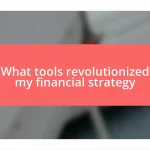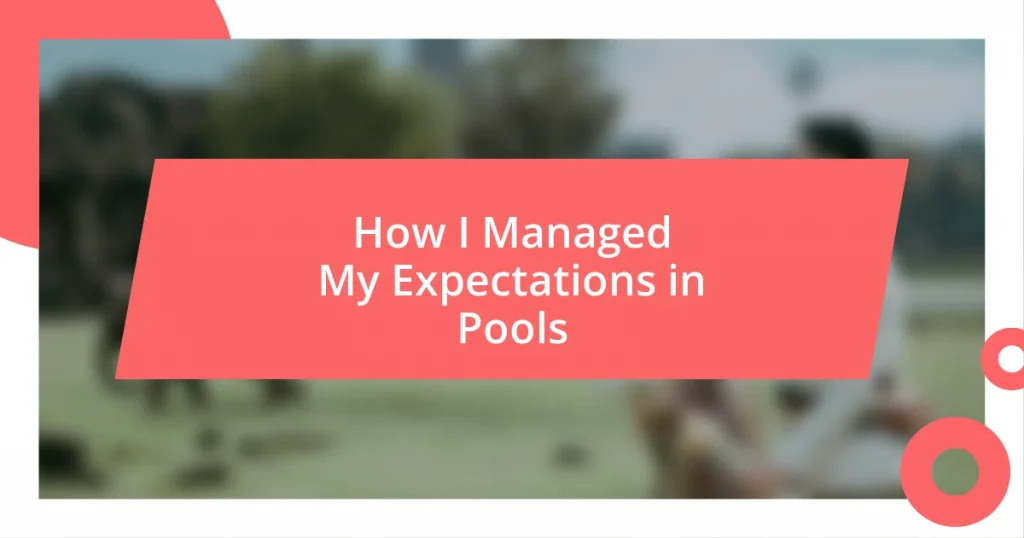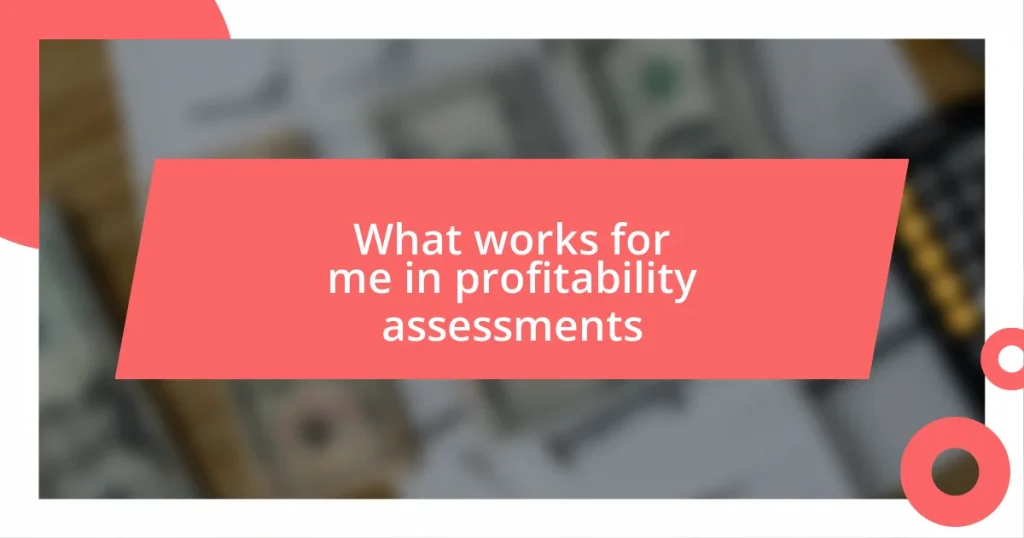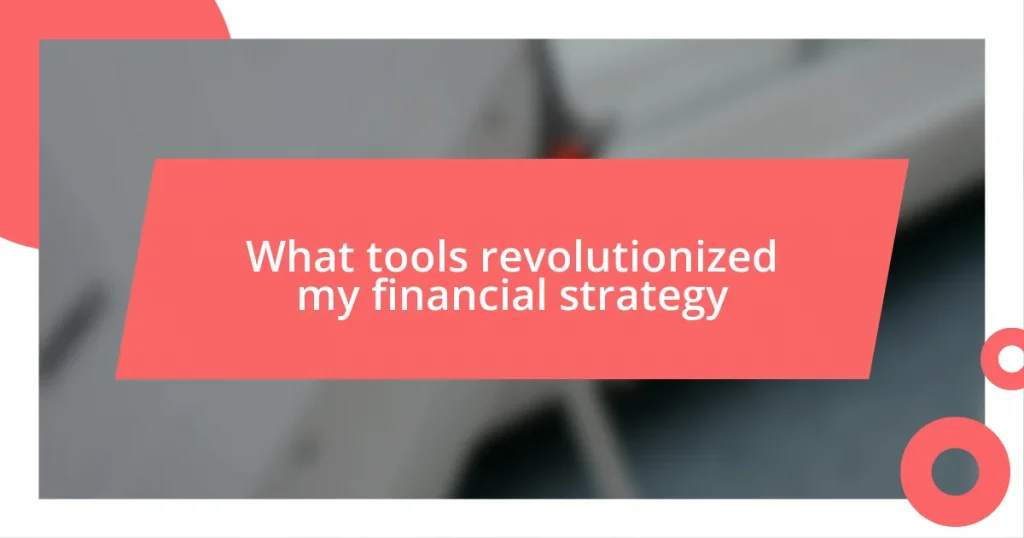Key takeaways:
- Embracing the learning process through setting realistic goals and celebrating small victories fosters growth and confidence in swimming.
- Honest self-assessment, combined with seeking help and feedback from experienced swimmers and coaches, enhances skill development and perspectives.
- Regular reflection on progress helps maintain motivation and recognizes incremental improvements, reinforcing a resilient and patient mindset.
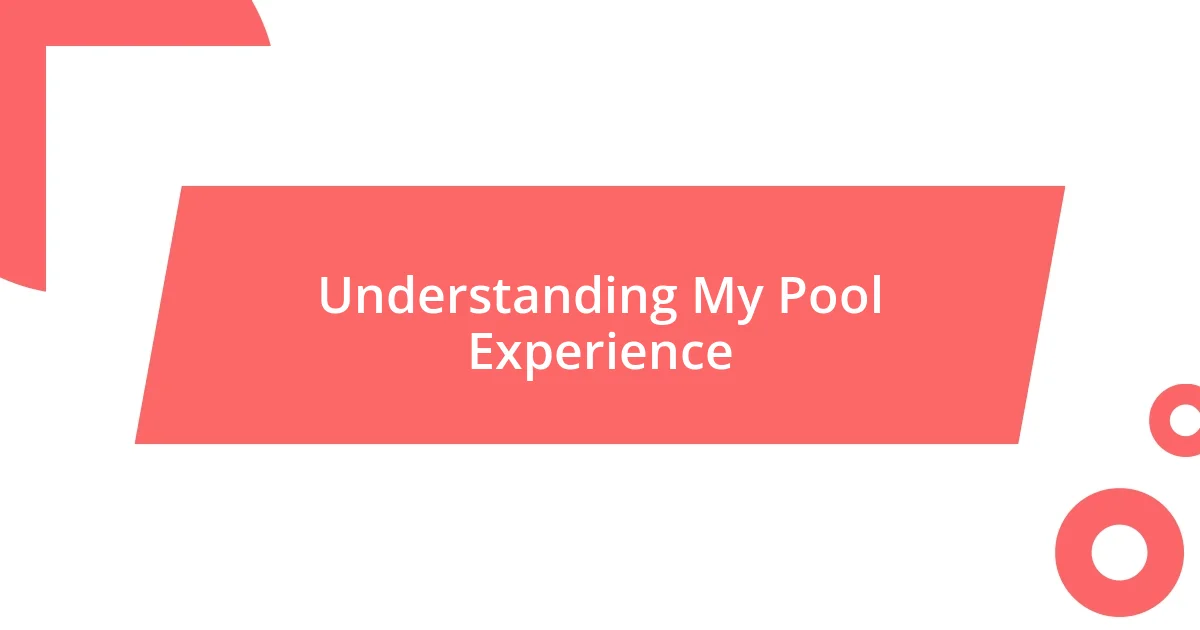
Understanding My Pool Experience
When I think about my experiences with pools, I can still remember the sheer excitement of diving into the cool water on a blazing summer day. The initial splash felt like an awakening, one that shifted my entire mood. Have you ever had that moment when time seems to stand still, and all your worries just fade away in the water?
There was a summer when I learned to swim, and I vividly recall the mix of apprehension and thrill that came with each lesson. My instructor was patient, and I often found myself battling my fear of getting too deep. Isn’t it fascinating how our fears can hold us back while simultaneously pushing us toward growth? These experiences in the pool shaped my confidence, teaching me not just to float but to embrace uncertainty.
Over the years, I’ve come to appreciate pools as more than just recreational spaces; they’ve been a canvas for personal reflection. After a long day, submerging myself in the calm waters feels like hitting the reset button. Have you ever emerged from the pool and felt as if you’ve shed more than just water? For me, it’s where I manage not only my expectations but also find clarity amidst the chaos of life.
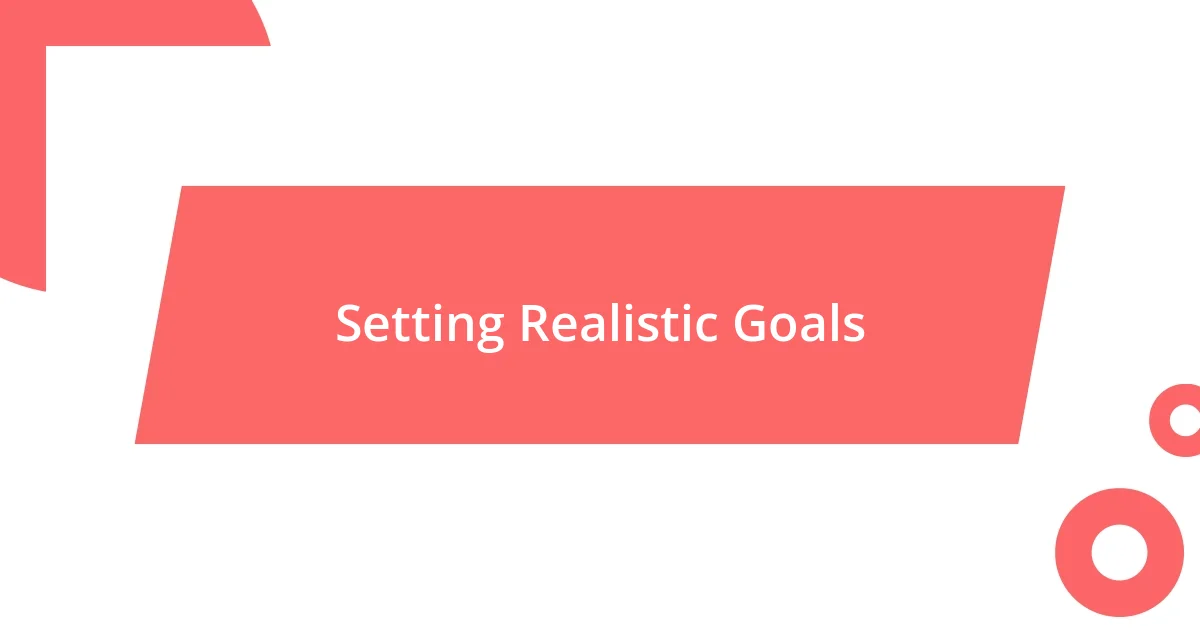
Setting Realistic Goals
Setting realistic goals is an essential part of navigating the world of pools. I remember the first time I aimed to swim a full lap without stopping. It seemed daunting at first, but breaking it down into smaller milestones made all the difference. Instead of stressing about the end goal, I focused on gradually increasing my distance each week.
Here are a few key pointers that helped me set more realistic goals in my pool journey:
- Start Small: Instead of saying “I’ll swim a mile,” I committed to swimming just one lap at a time.
- Be Specific: I noted down my targets, like “swim three times a week,” which helped in building consistency.
- Celebrate Progress: Each small victory, whether it was mastering a stroke or adding another lap, deserved recognition to keep my motivation up.
Sometimes, I had to adjust my expectations. For instance, when I struggled with a particular stroke, I learned to shift my focus from frustration to understanding. We all have unique journeys, and what’s important is finding joy in the process, rather than just fixating on the end result.
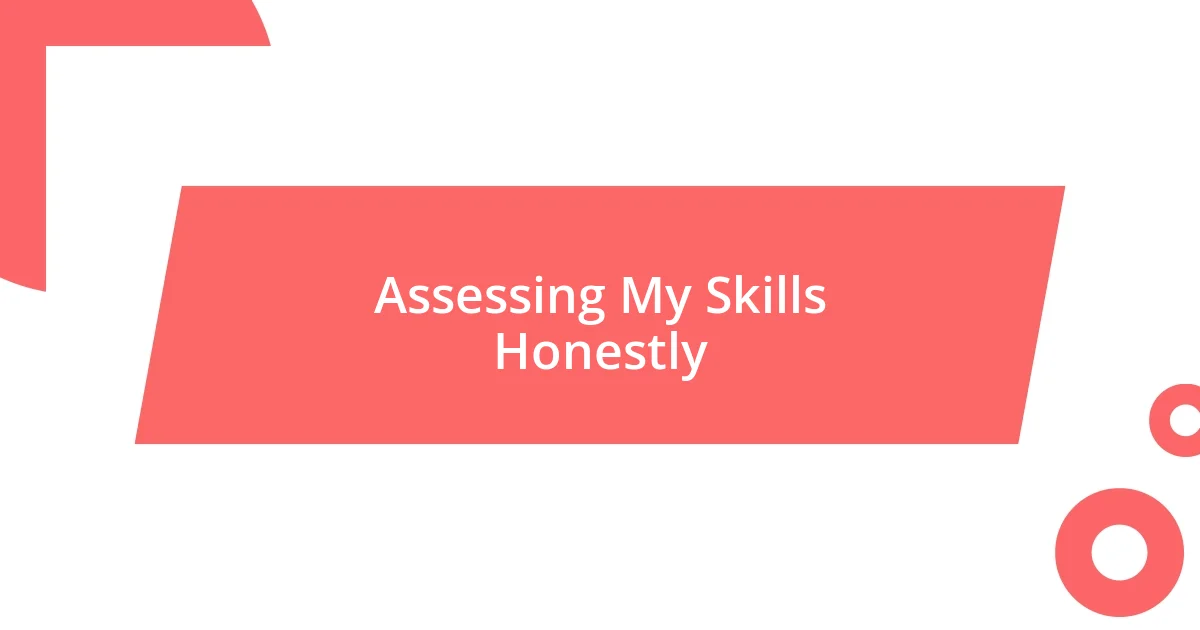
Assessing My Skills Honestly
When I took a step back to honestly assess my skills in the pool, I found it surprisingly eye-opening. I recall a time when I thought I was a strong swimmer, only to struggle during a friendly race with friends. The realization hit me hard: just because I felt good in the shallow end didn’t mean I could tackle the deep water effortlessly. Have you ever had a moment where you overestimated your abilities? It’s humbling, but it’s also a crucial part of growth.
Thinking about my technique, I realized that swimming isn’t just about stamina—it’s about precision too. There was a day I attempted to master the butterfly stroke, believing it was all about power. But, after several failed attempts, I understood that finesse and timing are equally important. This led me to seek feedback from more experienced swimmers, which was a game-changer. I’m curious—how often do we seek outside perspectives to truly gauge our skill levels? For me, it transformed my practice sessions entirely.
Lastly, I learned that self-compassion plays a significant role in this honest assessment. There were days I felt demoralized, especially when progress seemed slow. But I started telling myself that improvement takes time. I remind myself of this pivotal experience: one afternoon, after a frustrating lesson, I chose to reflect rather than criticize. It’s in these moments that I found the most valuable insights—not only about my swimming skills but also about my resilience and patience.
| Skill Level | Honest Assessment |
|---|---|
| Beginner | Realized I needed more practice with basic strokes and confidence. |
| Intermediate | Discovered that technique matters, not just endurance. |
| Advanced | Acknowledged that even seasoned swimmers have areas to improve and can learn from others. |
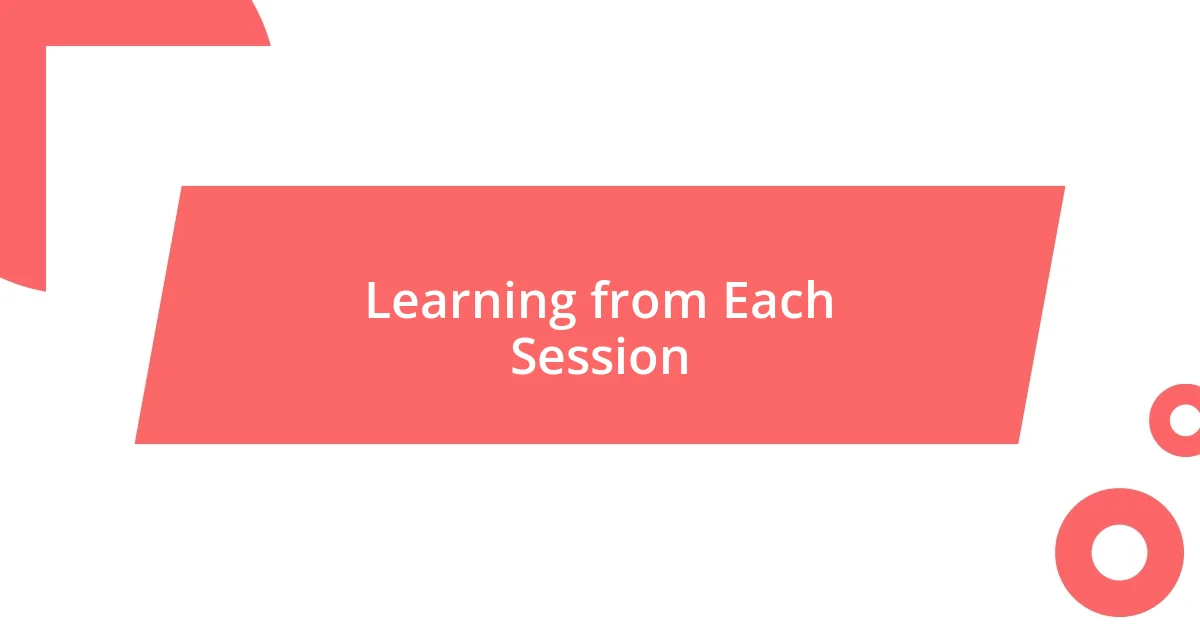
Learning from Each Session
As I dived into my training each week, I quickly realized that every session in the pool was a chance to learn something new. I remember one particularly grueling day when I was attempting to perfect my backstroke. After an hour of practice, it hit me: I was spending too much energy on my arm movements, and my legs weren’t doing their part at all! This realization shifted my focus entirely. Have you ever had a moment when the tiniest adjustment made a world of difference?
One of the best lessons I gathered from my sessions was accepting that mistakes are often the heart of growth. There was a time when I misjudged how much rest I needed between sets, leading to complete fatigue midway through. Instead of feeling defeated, I took that as a cue to fine-tune my pacing. Reflecting on that experience, I’ve learned that it’s about listening to my body and adapting my strategy. How often do we overlook those signals, thinking we just need to push through?
Feedback from each practice session became my personal guide. I remember chatting with a coach after struggling to keep my form during a drill. She offered insights on body alignment and breathing patterns that were enlightening. By embracing that guidance, I turned what could have been a discouraging moment into an opportunity for refinement. Isn’t it fascinating how someone else’s perspective can open new avenues for improvement? Each time I left the pool, I carried a nugget of wisdom with me, reminding me that the journey is just as valuable as the destination.
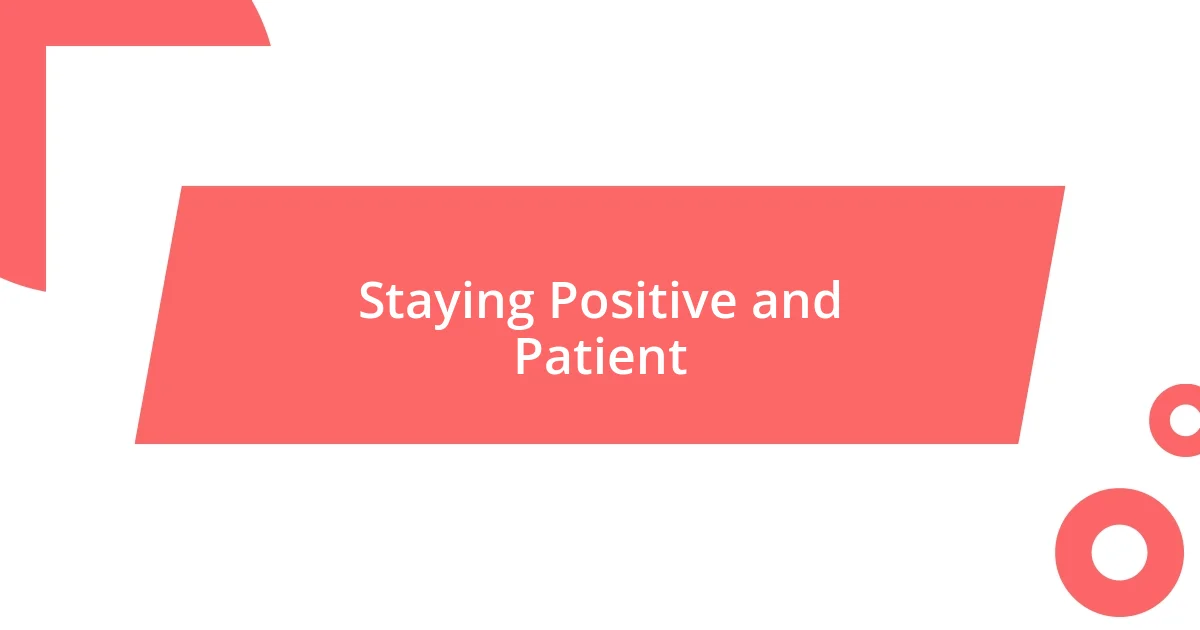
Staying Positive and Patient
Staying positive while tackling challenges in the pool can sometimes feel like juggling too many balls at once. I recall a particularly frustrating day when everything seemed out of sync. I remember standing at the edge of the pool, feeling the weight of my disappointments. Instead of letting that negativity engulf me, I took a deep breath and reminded myself that swimming is a journey. Have you ever found solace in simply acknowledging your feelings? That day, I decided to focus on what I could control—my mindset.
Patience became my ally in those testing moments. There was a time when I couldn’t master a simple flip turn, despite repeating it countless times. I felt like I was missing some secret key. But then a fellow swimmer shared their own struggles, making me realize everyone faces hurdles. This sense of camaraderie helped shift my perspective from frustration to acceptance. It’s in these shared experiences that I found reassurance. Do we often forget that we’re not alone in our challenges?
When I learned to embrace that pause—where I allowed myself to reflect—I noticed significant changes in my progress. I started celebrating small wins, like nailing a cleaner stroke or holding my breath longer. These little victories built my confidence and helped me cultivate a sense of optimism. Isn’t it interesting how a simple shift in focus can illuminate the path ahead? Through patience and positivity, I discovered not only a better swimmer within me but a more resilient individual ready to tackle whatever comes next.
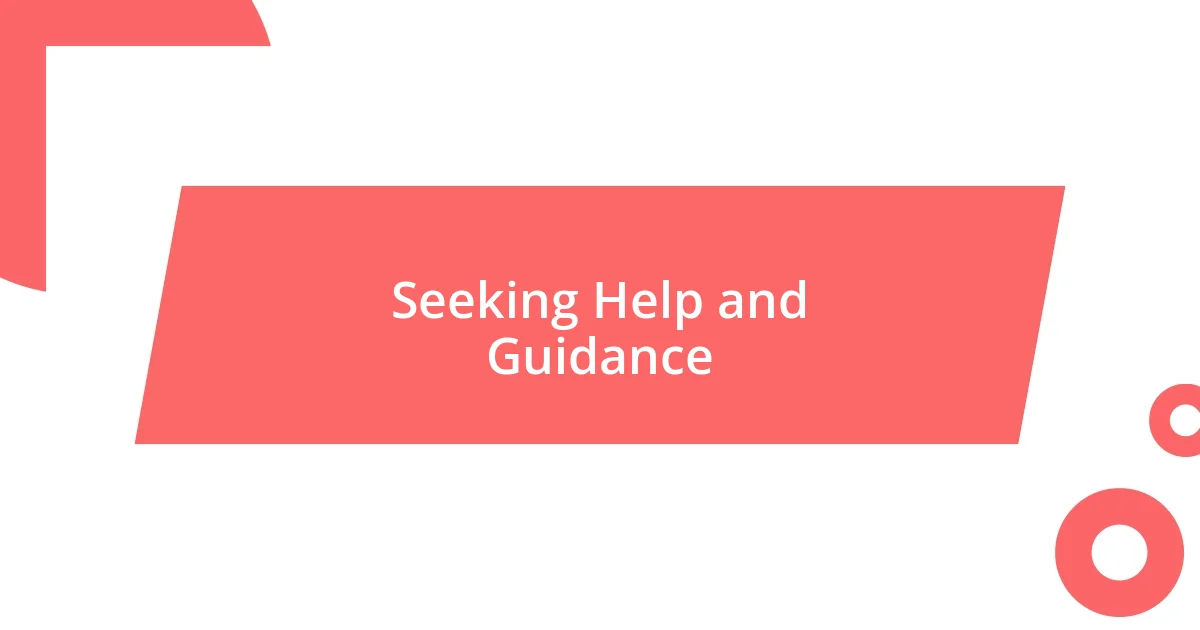
Seeking Help and Guidance
Seeking help and guidance became a pivotal part of my swimming journey, transforming my experience in the water. I vividly recall one day when I found myself struggling with my breathing technique. Feeling overwhelmed, I approached a fellow swimmer who had been a source of inspiration. I hesitated at first, wondering if admitting my difficulties would make me seem inadequate. But once I reached out, his simple tips were enlightening, making me realize that asking for help is a strength, not a weakness. Have you ever felt that unexpected boost from someone else’s experience?
Engaging with coaches and more experienced swimmers changed my approach completely. I remember standing on the pool deck, drowning in my insecurities while watching seasoned athletes glide effortlessly through the water. It took a moment of courage to ask a coach for personalized feedback. When she showed me how minor adjustments could enhance my stroke efficiency, it felt like a breakthrough. That experience taught me that seeking guidance isn’t about showing vulnerability; it’s about actively pursuing growth. How often do we overlook the wisdom that surrounds us in favor of going it alone?
Embracing mentorship also opened a door to a community that I hadn’t fully tapped into before. I joined a local swim club and was amazed at how supportive everyone was. The camaraderie and shared experiences pushed me to seek advice whenever I hit a wall. One evening, during a practice session, a teammate suggested we form a buddy system for drills. It was a simple idea, yet it made my training feel less daunting and more connected. Doesn’t it feel good to know you’re not the only one navigating the waters? In the end, asking for help made my swimming experience richer, reinforcing the idea that collaboration can amplify individual growth.
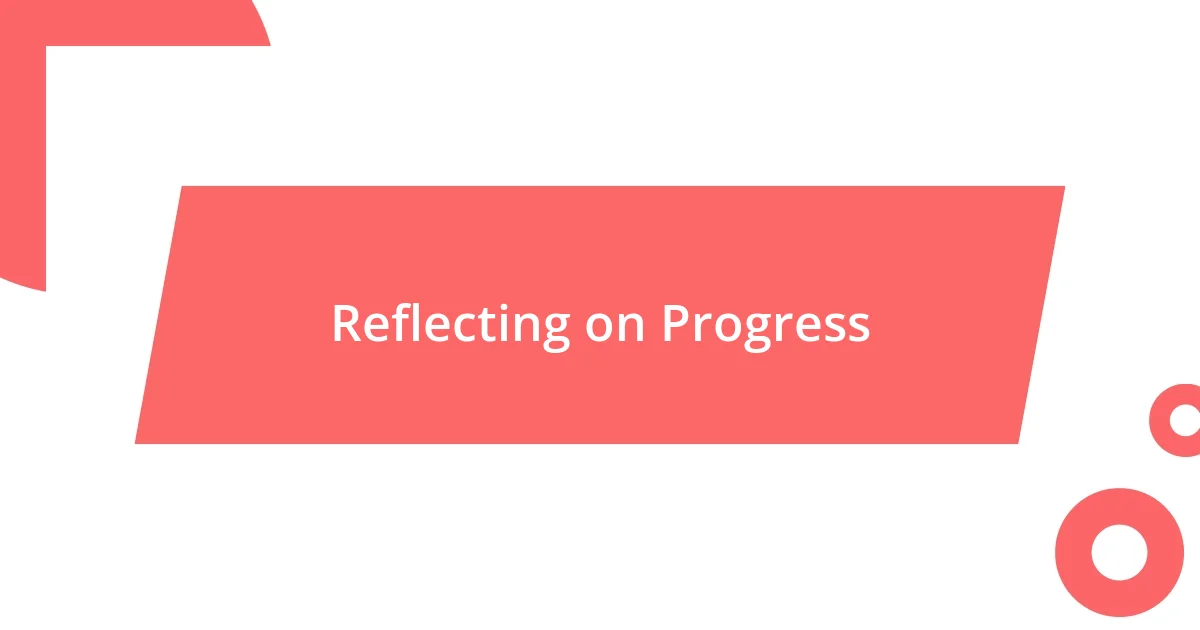
Reflecting on Progress
Reflecting on my progress has always felt like looking in a rearview mirror; it’s a chance to appreciate how far I’ve come. There were countless days when measuring my improvement seemed overwhelming, especially when I only focused on my challenges. I clearly remember one training session where I struggled to keep pace with the group. But upon looking back at my swim logs, I noticed I was swimming faster than I had just a few weeks prior. Isn’t it fascinating how reflection can reveal progress even when you don’t feel it in the moment?
In those quieter moments of self-reflection, I discovered a deeper understanding of my personal growth. I began to maintain a journal, jotting down my feelings and achievements after each swim. One entry stands out: after nailing a particularly challenging drill, I felt a rush of pride that lingered long after I exited the pool. I realized that documenting my journey not only served as a record of my achievements but also as a motivational tool. Have you ever written down your thoughts, only to be surprised at how they shift your perspective?
As I reflected on my consistent efforts, the connection between patience and progress became increasingly clear. Initially, I was tempted to rush through my training, always yearning for immediate results. But over time, I learned to appreciate the gradual climb rather than fixating on the summit. My mindset shifted dramatically when I started recognizing the significance of each practice session, no matter how small. Isn’t it amazing how reframing your goals can unlock new levels of motivation? By celebrating incremental progress, I not only enhanced my skills in the pool but also cultivated a resilient mindset that I carry into other aspects of life.


